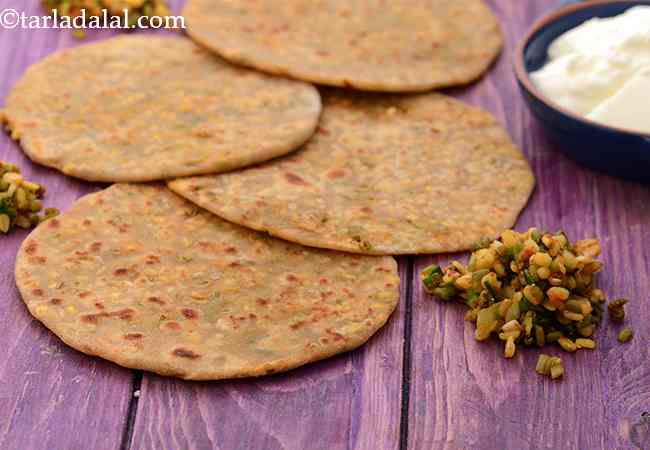Click here to view Dal ke Parathe recipe.
Sumptuous whole wheat parathas stuffed with a lip-smacking filling of soaked and sautéed green moong dal simply spiced with fennel seeds, turmeric and chilli powders. You might wonder what a quarter teaspoon of turmeric and half a teaspoon of fennel could be, but these wonder ingredients work magically to enhance the aroma of the green moong dal paratha when they get cooked on the griddle.
This healthy Indian lentil stuffed paratha is bursting with protein, thanks to the use of moong dal. protein is a key nutrient for repairing the worn out tissues of the body and also building new cells including the skin and immune cells.
And to that fact, it is also rightful that this dal paratha being made with whole wheat flour is rich in fibre and thus a wise addition to a diabetic, healthy heart and weight loss diet. The virtuous amount of magnesium in these parathas will further help in maintaining a healthy heartbeat.
Is Dal ke Parathe healthy?
Yes this is healthy. Let's see why.
Let's understand the Ingredients.
What's good.
1. Whole Wheat flour : Whole wheat flour is excellent for diabetics as they will not shoot up your blood sugar levels as they are a low GI food. Whole wheat flour is rich in Phosphorus which is a major mineral which works closely with calcium to build our bones. Vitamin B9 helps your body to produce and maintain new cells, especially increase red blood cells. See detailed 11 benefits of whole wheat flour and why it's good for you.
2. Moong Dal ( Green Moong Dal ) : Moong dal or green moong dal is rich in Folate, Vitamin B9 or Folic Acid which helps your body to produce and maintain new cells, especially red blood cells and is pregnancy friendly. Being rich in Antioxidants like Flavonoids, mung reduces the damage done by free radicals to the blood vessels and lowers inflammation. Moong Dal is heart and diabetes friendly. Moong Dal or Split Green Gram are high in Fibre and 1 cup of cooked Moong dal gives 28.52% of your daily Fibre requirements. See here for 9 fabulous benefits of Moong Dal.
Can diabetics, heart patients and over weight individuals have Dal ka Paratha?
Yes. Whole wheat flour is excellent for diabetics as they will not shoot up your blood sugar levels as they are a low GI food. Moong Dal is heart and diabetes friendly. Moong Dal or Split Green Gram are high in Fibre and 1 cup of cooked Moong dal gives 28.52% of your daily Fibre requirements.
Which other healthy parathas can i have?
Healthy paratha recipes like yellow moong dal and spring onion paratha made with whole wheat flour + yellow moong dal. Paushtic parathas, Green Moong Dal and Spring Onion Paratha recipe are another option.

Green Moong Dal and Spring Onion Paratha
Can healthy individuals have Dal ka Paratha?
Yes.
Dal ka Paratha is rich in below macronutrients, vitamins and minerals given in descending order (highest to lowest).
1. Phosphorus : Phosphorous works closely with calcium to build bones. 23% of RDA.
2. Vitamin B1 (Thiamine) : Vitamin B1 protects nerves, helps in carbohydrate metabolism, prevents heart diseases and helps produce red blood cells. 20% of RDA.
3. Folic Acid (Vitamin B9): Folic acid is an essential vitamin required throughout pregnancy. Folic acid rich Indian foods (kabuli chana, chana dal, yellow moong dal, urad dal, tooval dal, til ) 17% of RDA.
4. Fiber : Dietary fiber reduce the risk of heart disease, prevent the spike in blood sugar levels and hence super for diabetics. Consume more fruits, vegetables, moong, oats, matki, whole grains. 14% of RDA.
5. Protein : Protein is required for the managing the wear and tear of all cells of the body. Have protein rich Indian foods like paneer, curd, Greek yoghurt, tofu, almonds, sprouts, chana, rajma, chick peas, quinoa, buckwheat ). 13% of RDA.
Note : a recipe is deemed high in a Vitamin or mineral if it meets 20% and above the recommended daily allowance based on a 2,000 calorie diet.
How to burn 177 calories that come from Dal ka Paratha?
| Walking (6 kmph) = |
53 |
mins |
| Running (11 kmph) = |
18 |
mins |
| Cycling (30 kmph) = |
24 |
mins |
| Swimming (2 kmph) = |
30 |
mins |
Note: These values are approximate and calorie burning differs in each individual.